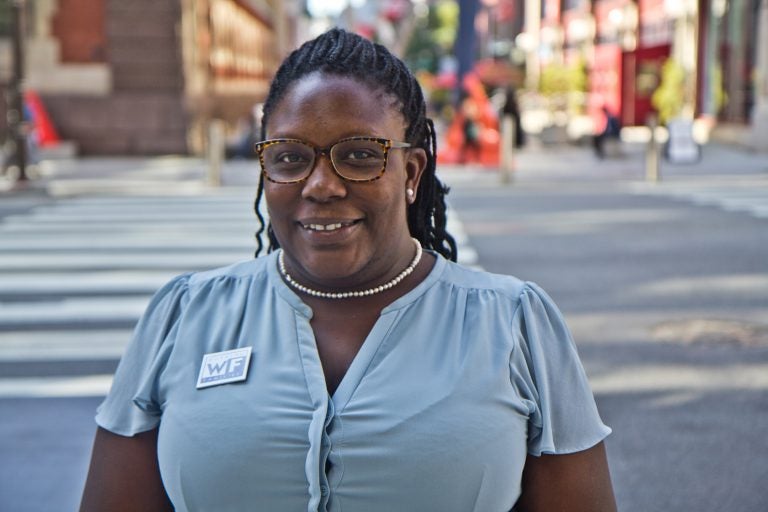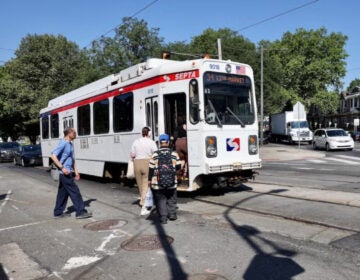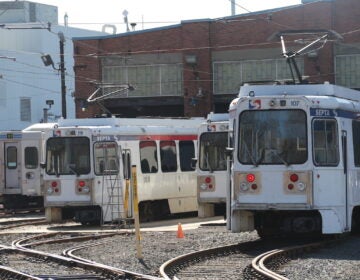Kendra Brooks wants to put affordable transit on City Council’s agenda
Kendra Brooks, who won a coveted endorsement from Elizabeth Warren, says affordable transportation is a major issue for Philly voters.

Philadelphia City Council candidate Kendra Brooks. (Kimberly Paynter/WHYY)
Kendra Brooks is ready to talk about SEPTA.
Brooks’ campaign for an at-large seat on Philadelphia City Council got a boost earlier this month from 2020 Democratic presidential candidate U.S. Sen. Elizabeth Warren and now, she is getting down to the issues that matter to Philly voters. Affordable transportation is one of them.
“For us to be the poorest big city in America — and a large portion of our citizens are using public transportation as a means to work, as well as engage their families — we need to find a way to make it more affordable,” said Brooks, who is running on the Working Families Party ticket.
City Council’s power over SEPTA is limited, but the legislative body holds the purse strings for a sizable portion of the state-chartered agency’s $1.49 billion operating budget.
The at-large candidate sees that role as an opportunity to evaluate the authority’s commitment to residents who rely on its services the most.
“As a councilperson, we can have deeper conversations about investments that the city makes into SEPTA and what that looks like in terms of supporting working-class folks, as well as students and children in providing free to low cost transit fares,” she said.
Brooks, a Nicetown resident and mother of four, is running a grassroots campaign made possible by the more than 3,000 petition signatures that earned her a spot in the fall election. One goal is to kick Republicans out of the two at-large seats, which are reserved for the minority party or independents.
Warren isn’t the only Democrat who’s endorsed Brooks. Popular City Council member Helen Gym also offered her support, and even Mayor Jim Kenney gave a nod saying “Kendra’s a good person,” while decrying Warren’s endorsement of the third-party candidate.
More bus lanes and affordability for families in need of a ride
Brooks will be joined on the ballot by fellow Working Families candidate Rev. Nicolas O’Rourke, a pastor at Living Water United Church of Christ in Oxford Circle. The West Philly resident is also a community organizer for POWER, a progressive interfaith advocacy organization.
Both Brooks and O’Rourke want to make changes to help poor and working-class residents with housing, education, criminal justice, and accessibility issues. And people are going to need to get around with little-to-no hassles if they’re going to make progress.
That means eliminating fares for children and students and ending transfer fees, they said. SEPTA is currently exploring the elimination of transfer fees, but $12 million in revenue is at stake.
“It does create a situation for us in that we want it to be neutral in terms of cost to SEPTA,” said Jeffrey Knueppel at a budget hearing this past spring. “Because if we lose income, we have to reduce service and we don’t want to do that.”
That explanation doesn’t hold water for O’Rourke. “Organizations will find money for anything else,” but tend to not have money “when it comes time to invest in areas that have been consistently and systematically divested from,” he said.
“I believe they have the resources,” the pastor said. “I would be happy to work with them to figure out how we can find those funds to make sure that we prioritize those that have not been prioritized.”
Affordability could also help with the city’s growing congestion problem by making public transit a more viable option for families with multiple children like her own, Brooks said.
Travel for her three children can cost up to $9 a head per trip, she said.
“My family uses rideshare when traveling in multiples because it is cheaper than getting on the bus,” said Brooks.
O’Rourke said dedicated bus lanes could be another solution for the city’s traffic problem.
If people “can’t get to work on time because their only source of transportation is consistently late,” said O’Rourke. “That’s not helpful [for] folks trying to improve and get ahead in their own lives.”
Currently, only Market and Chestnut streets and Roosevelt Boulevard have dedicated bus lanes, but the authority expects to include more in their Comprehensive Bus Network Redesign.
Local voters will decide who gets the coveted at-large seats on Nov. 5.
WHYY is your source for fact-based, in-depth journalism and information. As a nonprofit organization, we rely on financial support from readers like you. Please give today.







